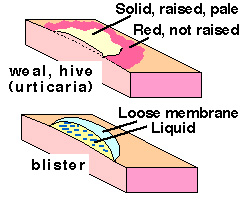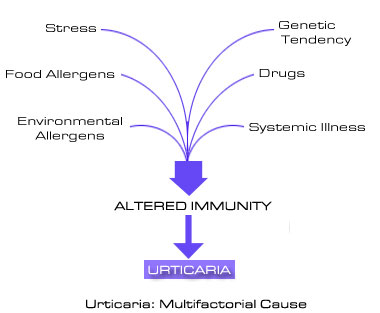|
Urticaria also called nettle rash or hives or wheals in common language simply means itching with rash. It is an allergic skin disorder. It refers to a group of disorders affecting adults and children, in which red patches and wheals occur in the skin.
The release of chemicals such as histamine from mast cells in the skin causes small blood vessels to leak and result in tissue swelling. The wheals can be a few millimeters or several centimeters in diameter, colored white or red, often surrounded by a red flare, and frequently itchy. Each wheal may last a few minutes or several hours, and may change shape. Wheals may be round, or form rings, a map-like pattern or giant patches. |
|
|
 |
The surface wheals may be accompanied by deeper swellings of eyelids, lips, hands and elsewhere. The swelling is called angioedema. Angioedema may occur with or without urticaria wheals. Angioedema can cause disableing swelling of internal organs, life-threatening blockage of air passages, or severe, uncontrollable intestinal contractions. If the swelling occurs in the throat, it can cause suffocation.
These eruptions can remain on the body for variable period, anywhere between few seconds to even hours. They have tendency to disappear and reappear. They tend to disappear without leaving behind any trace.
Types of Urticaria or Hives or Nettle Rash:
a) Allergic urticaria : When an allergen invades or irritates your body, it unleashes chemicals known as histamines.Some people react to a high histamine level by developing the rash we call hives.
b) Non allergic urticaria
I) Acute urticaria : It may be caused by an allergy and can last between several hours and many weeks. The most likely triggers for acute urticaria are allergies to pets, horses, latex and foods, such as shellfish and nuts in adults and eggs and cow's milk in children.
II)Chronic urticaria : It is not usually caused by an allergy. It refers to hives that persists for 6 weeks or more. There are no visual differences between acute and chronic urticaria. The cause of chronic urticaria is often more difficult to identify. Most cases are called chronic idiopathic urticaria, which means they are caused by the body's unexplained
development of antibodies to itself (auto-antibodies or auto-immune).
c) Drug induced urticaria : Certain drugs like anti diabetic sulphonylurea glimepiride (trade name Amaryl), aspirin, penicillin, sulfonamides and anticonvulsants and so on.
d) Physical urticaria : It is triggered by physical factors and lasts only an hour or two and is often categorized into the following :
e) Aquagenic : Reaction to water.
f) Cholinergic : Reaction to body heat, such as when exercising or after a hot shower.
g) Cold (Chronic old urticaria) : Reaction to cold, such as ice, cold air or water.
h)Delayed pressure : Reaction to standing for long periods, bra straps, elastic bands on undergarments, belts.
i)Dermatographic : Reaction when skin is scratched.
j) Heat : Reaction to hot food or objects.
k)Solar : Reaction to direct sunlight.
l) Vibration : Reaction to vibration.
m) Adrenergic : Reaction to adrenalin / noradrenalin.
|
|
|
|
| Causes of urticaria: |
Like many other disease conditions, we know what happens in urticaria more that what exactly causes urticaria (hives). In almost half the cases we know what causes or induces urticaria; and half the time, the patients or we have no clue as to its exact cause.
Many people including some doctors believe that urticaria is allergic in nature. Actually, it must be noted that Urticaria is not always allergic in nature. There are allergic and non-allergic causes for chronic urticaria. The non-allergic causes include auto-immunity related, hormonally triggered, stress triggered, exercise, drugs, temperature based and other factors.
We shall try to examine some of the most common exciting factors known to induce urticaria (hives), which may be grouped as:
Allergens:
A large number of allergens have been identified as causative agents for some cases of urticaria. It may be noted that urticaria is an individual hypersensitivity and the following factors may not cause urticaria in all urticaria-prone individuals.
Food allergens:
Milk, cheese, egg, protein products, wheat, cereals, nuts, certain daals as used in India, peas, orange, fish, chicken, etc. Synthetic and natural food additives and artificially-flavored food articles.
Urticaria and alcohol:
True anaphylactic reactions to alcohol (ethanol) are rare and most reactions to ingested alcoholic beverages are secondary to other chemicals in the beverage such as metabisulfite, papain, dyes or yeasts. However, there are reports of true allergic reactions in which the offending agent was shown to be the ethanol itself. Generally the symptoms of anaphylaxis occur in such patients following the ingestion of beer and/or wine. Urticaria rashes have been reported with ethanol ingestion; and hives on contact with ethanol have also been reported for some patients of urticaria. |
 |
Environmental factors:
Exposure to pollen, house-dust, buffalo dander, fungi, change in temperature, etc. are known exciting factors. Extreme cold, heat, pressure may also induce urticaria.
Drugs:
The major cause for urticaria are man-made drugs such as antibiotics (Penicillin), NSAIDs, anti-inflammatory drugs (aspirin, indomethacin), vaccinations, foreign sera, hormonal preparations, contraceptive pills, etc. Animals treated with penicillin excrete a small amount of it in the milk sufficient to cause urticaria in sensitive individuals.
Cholinergic factors:
Urticaria often gets triggered or aggravated by exercise, pressure on some part of the body as well as change in temperature of body after sweating. Such changes affect nerve ending of skin which leads to development of urticaria rash. In this variety of urticaria one experiences itching, burning and local heat on skin.
Urticaria and cocaine:
There have been reports of morphine-induced hives in some people. Bronchospasm may occur in some patients who smoke cocaine or in those who inject heroin. This may occur more often in patients who have a previous history of asthma. Hypersensitivity pneumonitis to cocaine has also been described and is associated with elevated levels of IgE.
Infections and infestations:
Insect bites, Fungal, protozoal, frequent bacterial infections (Urinary tract), viral infections (Hepatitis), helminthiasis (worm infestations such as round worms, tapeworms), etc. are factors known to cause urticaria. Domestic contact with the pet animals should be examined as cause for urticaria.
Synthetic products:
Use of personal products such as deodorant, perfume, and talcum powder, cosmetic products, animal derivatives, and similar synthetic substances may induce this disorder.
Emotional factors:
Especially in chronic, recurring cases of urticaria the role of emotional factors must be examined. Emotional stresses may directly or indirectly make on susceptible to develop a tendency to urticaria. The psychological factors may work as exciting, aggravating or maintaining cause. Especially, if you are under prolonged stress, anxiety, sadness or insecurity, such intense emotions could alter your immunological state and in turn lead to hypersensitivity.
Autoimmune causes: Chronic urticaria is now understood to have autoimmune link. Presence of auto antibodies against Immunoglobulin E (IgE), CD23 (FcεRII or Fc epsilon RII) which releases histamine, hence leading to chronic urticaria.
Systemic and general disease:
Urticaria in some cases may present as a sign of other systemic or general internal disease such as hormonal disorders (hyperthyroidism), SLE, polycythaemia, reticuloses, etc. In certain variety of malignancies (cancer) urticaria may present as a precursor.
Idiopathic cause:
No list of causation is complete without adding a paragraph of 'Idiopathic' which simply implies causes which are unknown.
Symptoms of Urticaria or Hives or Nettle Rash
"In chronic cases, the itchiness may cause sleepless nights and leads to depression."
The rash is very itchy and consists of a number of raised bumpy wheals surrounded by red skin. Ordinary urticaria tends to move about or migrate all over the skin surface.
The condition tends to settle and then relapse again at times of viral illness, stress and after taking medication that contains aspirin. This chronic pattern may recur for many years.
Tissue swelling, called Angioderma, may occur with urticaria. This affects the lax tissues around eyelids, lips, neck and groin. |
|
|
| Diagnosis of Urticaria or Hives or Nettle Rash |
A careful case analysis and evaluation is required to make a correct diagnosis. There is no need for specific investigations in most of the cases of urticaria. However, the tests may be helpful in some cases :
Complete blood count to identify eosinophilia caused by allergy or parasitic infestation, and low WBC from SLE.
Thyroid antibodies and function in chronic urticaria.
Comprehensive allergy screening. Blood tests for specific allergy (RAST, or radiollergosorbent tests, or CAP fluroimmunosay).
Skin biopsy if wheals are prolonged.
Homeopathic Treatment of Urticaria or Hives or Nettle Rash
Homeoapthic approach to urticaria or hives or nettle rash
Chronic urticaria calls for another approach. Uriticaria is merely a symptom and not a disease by itselft. However, it should be regarded as a significant reflection of the internal system dysfunction.
Urticaria ought to be appreciated as an external signal of internal derangement and accordingly, should be treated with thorough assessment of the entire human system.
Homeopathy has been recognized as a significant medical therapy for urticaria in particular and chronic diseases in general. Homeopathy, a rapidly growing alternative medicine offers excellent treatment for urticaria. The objective of taking treatment is to provide comfort. Homeopathy provides it without any side effects.
The homeopathic approach is a natural way to help the body by supporting the body's own process of healing. It involves the use of extremely diluted natural substances to heal the body through the release of vital energy.
Also homeopathic medicines will shut allergy like switching off, but it desensitizes the body to the allergen by improving immunity. Thus it helps the patient to live in their circumstances. The treatment plans thus designed is addressed towards correcting the immune system, in turn treating urticaria from within. |
|